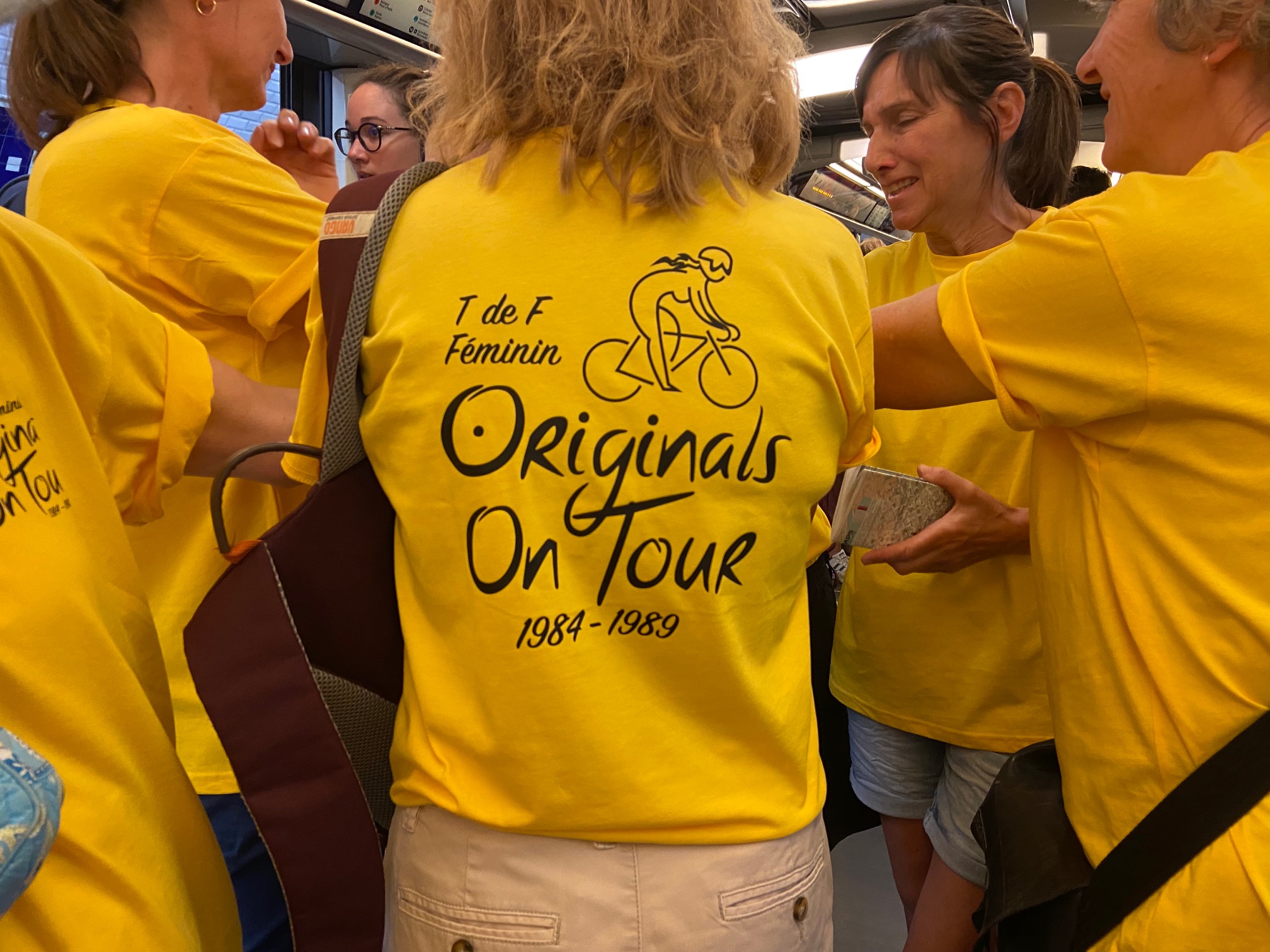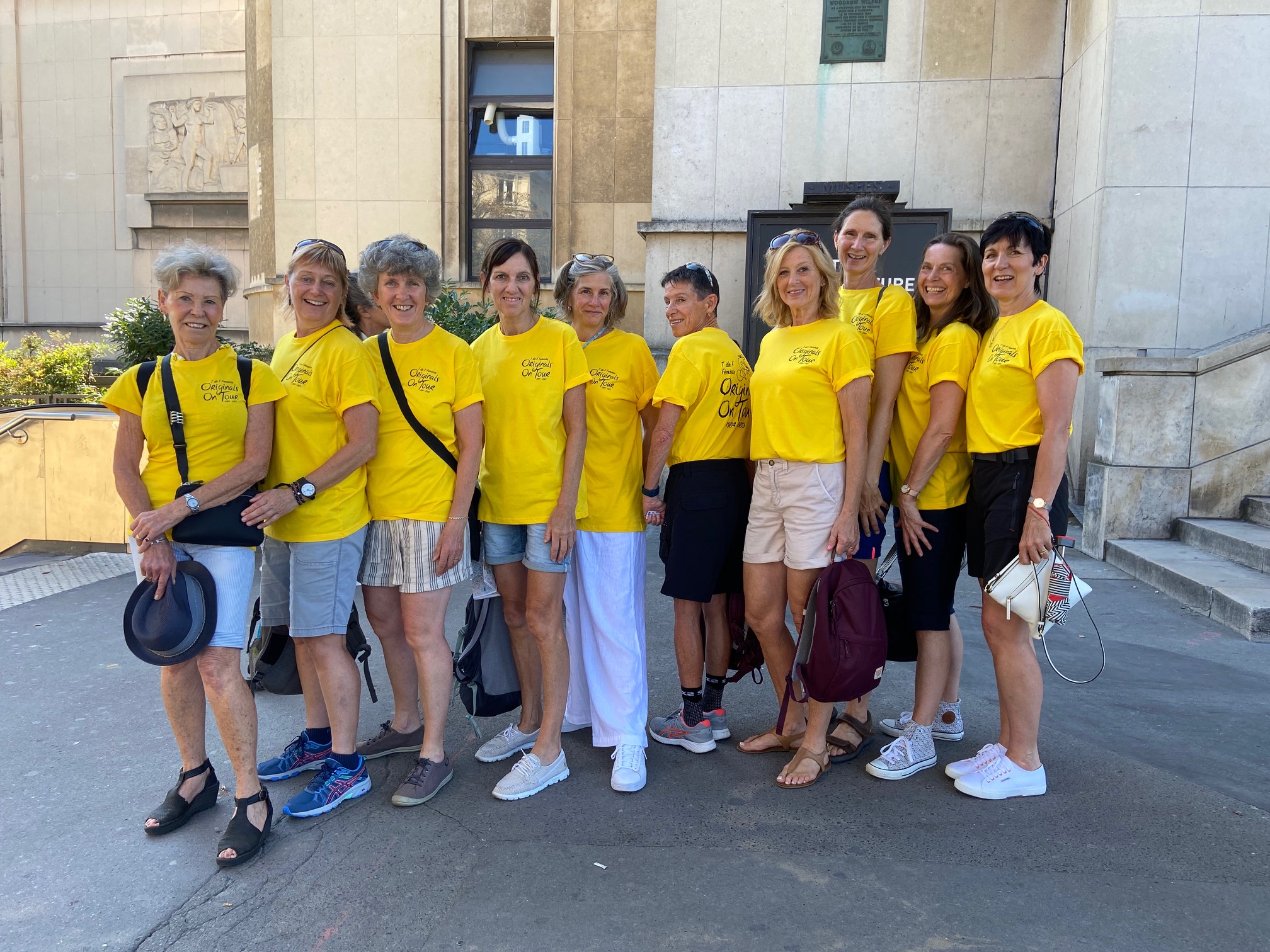Nostalgia and celebration - Women's Tour de France pioneers reunite in Paris
Matching T-shirts part of celebration for 1982 World Champion Bishop and group of inspirational women

A group of women standing together on the metro on their way toward the exit to the Eiffel Tower might have been mistaken for tourists if not for the bright yellow self-made T-shirts that read - T de F Originals on Tour 1984-1989 - that, for anyone who has followed professional cycling would recognise them as the pioneers of the women's Tour de France.
On the same train and headed in the same direction to the start of stage 1 of the rebirth of women's Tour de France, now called the Tour de France Femmes avec Zwift, Cyclingnews spoke with Mandy Bishop (née) Jones and Trish Liggett (née) Tipper about their journey to watch the new generation of women racing in one of the biggest sporting events in the world.
"I raced in the 1985 edition. It's really exciting that we are all meeting up because some of us haven't seen each other in 30-odd years, and it's been entertaining," Bishop, the 1982 World Champion, told Cyclingnews.
"The Tour de France didn't invite us, and ASO doesn't know we're here. We've just done this on our own. We decided to have a get-together and support the start of the new women's Tour - and remind them that we've done it as well.
"We started digging through archives, looking at pictures. My daughter made the T-shirts, and one of the other women's daughter's got them all printed up. We've got to have T-shirts."
The original women's Tour de France was organised by the former Société du Tour de France, with the last edition held 33 years ago. On Sunday, ASO welcomed the women's peloton back into the Tour de France, and the women began a 1,029-kilometre eight-day race held from July 24-31.
There are some differences between the two events. The former women's Tour was held across roughly 1,000km and raced in 18 stages that followed the last section of the men's route. The women also climbed iconic mountains such as l'Alpe d'Huez.
Get The Leadout Newsletter
The latest race content, interviews, features, reviews and expert buying guides, direct to your inbox!
The new event is eight days and held across northeast France with stages suited to every type of rider, from sprints to puncheurs and climbers, finishing at the top of La Planche des Belles Filles in the Vosges.
Stage 21 of the men's Tour de France will be held in conjunction with stage 1 of the women's Tour de France on the Champs-Èlysèes. Many believe that the women's race will benefit from being held the week after the men's Tour de France to give it its own space and visibility.
"The fact that it's happening is great. When we raced, they ran it in conjunction with the same event with the same finishes as the men. We were amateur women and not allowed to ride that race, and they split the event for us (with rest days)," Bishop said. "There have been massive changes over the years, and they didn't think women could ride that far back then. We proved them wrong. It's great they are doing it again.
"It's a balance, and you don't know if it's better this way or running it together with the men. You have to try it out both ways to get a better sense of which way is better. If it's on with the men, you've already got the fans out to watch, but this new way, they get their own space."
At the time of our interview, while riding the metro, Bishop told Cyclingnews that she didn't feel deep emotions toward this event's rebirth - but that it just felt like the timing was right. "Not massively strong emotions or feelings, no. I think it's really exciting to have a get-together to celebrate it."
The group borrowed the Rayner Foundation vehicle to make the trip from the UK to Paris. Even with the van's ignition struggles and breaking down several times on route, it created memories and stories for this group of women to reminisce over on their return home and for years to come.
"We can turn it off, or it takes 20 tries to get it started again. We've been laughing about it the whole time. It didn't matter; we wouldn't let that stop us from being here."
'We didn’t moan and groan, we were excited to be there'


Joining the riders on their trip to Paris is Liggett, who was the British team’s manager and masseuse for five of the six Tours de France Féminins of the 1980s. Wife of well-known cycling commentator Phil Liggett, she had spent much of her life involved in cycling, but managing a team at the women’s Tour de France was a new challenge.
“I’m not quite sure how I got the job,” she said of the call up to help the six-women, amateur teams that went to France each year. Women’s teams were few and far between in Great Britain the 1980s, experienced team managers even rarer, but with Liggett’s background in cycling and sports massage.
“I was doing stuff with the British Cycling federation and I was recommended, so I was asked to do it. I ended up doing five of the six. I was also quite commonly known in the area from being known in cycling, so it was just a progression in helping people.”
Liggett speaks proudly and fondly of what she did to help the team in the races that, though difficult, they were deeply happy to be racing. Early starts, late transfers, being fed steak and chips at 4 a.m., but Liggett did what she could.
“I got sponsorship for the girls, we had sweatshirt, shoes, food - because I knew I couldn’t do that steak thing, I said ‘forget that, girls, I’ve got this for you instead’.
“We adapted to everything. We didn’t moan and groan, we were excited to be there, actually. We were pioneering something that had never been done before. Things have grown and changed so much in the future but we knew nothing else and we just did what we needed to do.”
Despite the years they spent racing together, most the women assembled in Paris had not seen each other since the Tour de France Féminin ended.
“I met Mandy a few times, but basically no, we’ve not met each other for 35 or 36 years.” Liggett said. “It’s fantastic, we’ve had a fabulous time.”
There’s an air of a reunion among the former riders, sharing stories of the Tour, trying to remember the names of other riders they raced against. Being in Paris is a special moment for them: remembering the past, reminding the cycling world of what they did first, but also a celebration of how far their sport has come. The Tour that starts in Paris will be a world away from the Tours of the 1980s, and it’s a sight the Originals are happy to see.
“It’s not concurrent with the Tour de France, but it’s part of it, in [ASO’s] eyes,” Liggett said. “It’s great to have more women’s racing, high quality women’s racing. From the 80s to now, women’s racing has vastly, vastly changed. You have first-class competition now, really high level, trained, everyone knows what they’re doing. They’re professionals - these girls were all amateurs, all working, just come out for the three weeks to do the race. The women have come on leaps and bounds now and this will be a very very good event.”
Among the female pioneers pictured above are: Mandy Jones, Judith Painter, Clare Greenwood, Sue Thompson Gornall, Linda Gornall, Mel Grivell and Louise Garbutt.

Kirsten Frattini is the Deputy Editor of Cyclingnews, overseeing the global racing content plan.
Kirsten has a background in Kinesiology and Health Science. She has been involved in cycling from the community and grassroots level to professional cycling's biggest races, reporting on the WorldTour, Spring Classics, Tours de France, World Championships and Olympic Games.
She began her sports journalism career with Cyclingnews as a North American Correspondent in 2006. In 2018, Kirsten became Women's Editor – overseeing the content strategy, race coverage and growth of women's professional cycling – before becoming Deputy Editor in 2023.